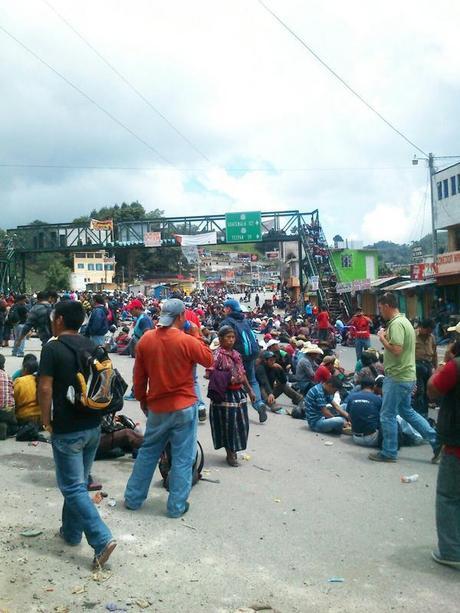from Revolution News

The bill–also known as the “Monsanto Law” because of the GM seed and agrotoxic multinational company’s involvement in its promotion in several Latin American countries–was appealed before the Guatemalan Constitutional Court, while different mobilizations were planned both in the capital of the country and in other departments on Tuesday, Aug. 26, 2014.
Antonio Gonzalez, member of the National Network in Defense of Food Sovereignty in Guatemala (REDSAG) and the Latin American Agroecological Movement (MAELA) said in a press conference that “this bill risks biodiversity, native seed varieties that are over 7,000 years old and that never required patents or labs, but have been able to sustain the lives of the Guatemalan people. We are speaking of privatizing ancestral knowledge and one of the risks is the disappearance of the “milpa system”. This is a small-scale self-consumption agriculture and commercialization system involving maize, pumpkin, medicinal herbs and beans, typical crops of peasant-indigenous agriculture in Mesoamerica and especially Guatemala. “We will no longer be the sons and daughters of maize, we will be the sons and daughters of GMOs”, said Antonio Gonzalez, who also denounced the actions by the government in favor of transnational seed companies.
Meanwhile, Glenda de Leon, also member of REDSAG, said in a press conference that the regulation will directly affect peasant and indigenous women, deepening the dependence of the food chain on transnational corporations that unlawfully hold intellectual property rights over plant varieties. In a publication, the Rural Studies Collective (Cer-Ixim) warned about the consequences of this “Monsanto Law”. They explained that under this law the possession or exchange of seeds of protected varieties without the breeder’s authorisation will be illegal and punishable by imprisonment.
It will also be illegal, and punishable by prison, to posses the harvest from such seeds or to save them for future plantings. According to the law, the breeder’s right extends to “varieties essentially derived from the protected variety.” In this sense, a hybrid produced from a protected variety crossed with an unprotected variety would automatically belong to the breeder of the patented variety. The law thus promotes privatisation and monopolies over seeds, endangering food sovereignty, especially that of indigenous peoples, said Cer-Ixim. It also warned that Guatemala’s biodiversity will fall “under the control of domestic and foreign companies.”

The National Alliance for Biodiversity Protection has even said the law is unconstitutional “because it violates the rights of peoples. It will benefit transnational seed companies such as Monsanto, Duwest, Dupont, Syngenta, etc. ” “According to this law, the rights of plant breeders are superior to the rights of peoples to freely use seeds,” the Alliance said in a statement issued in late July. “It’s a direct attack on the traditional knowledge, biodiversity, life, culture, rural economy and worldview of Peoples, and food sovereignty,” it added.

Virtual campaign
Artists and television celebrities have joined an online signature campaign to reject the law.
Their petition is addressed to the President, Otto Perez Molina, via the Avaaz website, and argues that the law is unconstitutional.
“This law violates articles of the Constitution relating to the Protection of Individuals, Cultural Identity, Natural Heritage, Right to Health, the principles of the Economic and Social Regime, in addition to the obligation of the state to protect consumers,” the petition states.

